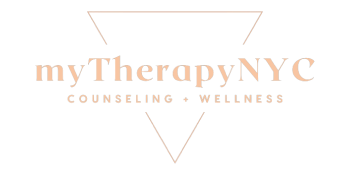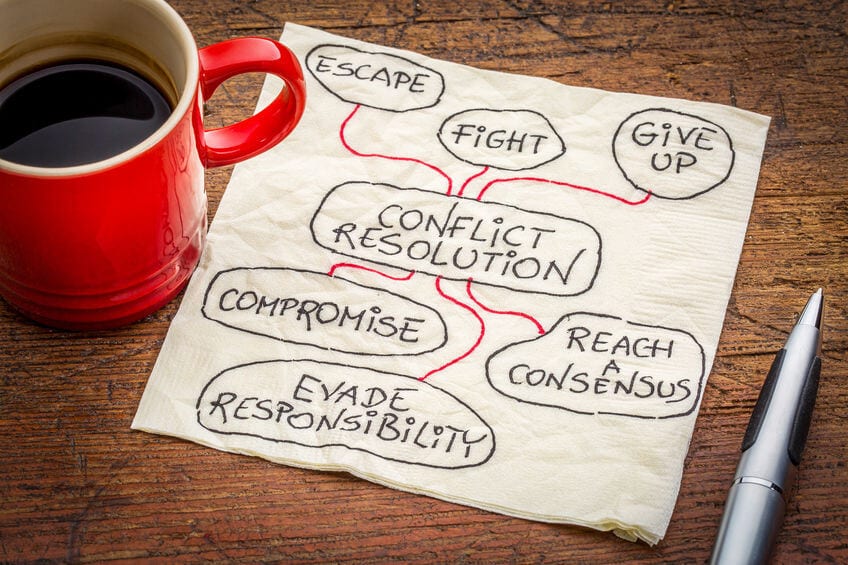Is conflict a bad thing? Not always. Sometimes conflict can be approached as an opportunity to address an issue that has been a problem for a while, or as an opportunity to discuss something that has suddenly become a problem. When we look at conflict in its purest form, we can see that it simply indicates that something has happened that one or more parties do not agree with. Once we allow ourselves to see the conflict as a situational experience that can lead to emotional growth, we can move towards processing that experience.
Conflict resolution can be the start of a renewed relationship with someone. It can also promote a healthier relationship and a mutual respect for one another. The healthiest way to approach conflict resolution is through effective communication, the ability to be open minded, and the ability to listen carefully without judgement or resentment.
Identify the conflict to resolve
Sometimes the issue that appears to be the center of a conflict is not actually the real problem. In these cases, a person may be upset with another person about a conflict that was never resolved and, as a result, they are holding on to resentment and feel like they are ready to explode at any minute. Some people refer to this as “the last straw” while some express feeling like they can’t take the tension in the room any more. Once you identify the core conflict, you can begin to explore the feelings, thoughts, and emotions attached to it. While approaching, exploring, and attempting to resolve conflict, it is totally normal to feel some anxiety; therefore, it is a good time to be mindful of your breathing.
Read more: Slow Down Your Breathing to Feel More in Control
Be willing to discuss conflict
Are you and the other person interested in resolving the conflict? In some cases, people have no interest in conflict resolution, as they have made a conscious decision to hang on to their position and refuse to negotiate or hear the other person out. If this is the case, perhaps the other person needs more time to sort out their feelings. But hanging on to frustration derived from conflict is unhealthy. When we allow ourselves to show up in a mature manner, we set the stage for a healthy dialog that will more likely than not end well.
Check your ego at the door
It is not easy to hear someone say that you did something they did not like agree with. In fact, during conflict resolution, many people will become angrier at the idea of being blamed for a conflict. Remember to be mindful of what you say and how you say it, as certain tones can easily be mistaken for aggression. Also, be willing to listen even when it feels a little uncomfortable.
Watch: 6 Steps to Becoming an Engaged Listener
Agree to disagree
There is nothing wrong with disagreeing with someone. We all have our own opinions and it is important to respect the thoughts, values, and beliefs of others. Don’t get me wrong, this does not mean that you have to cosign someone’s irrational thoughts, values and beliefs. It simply means that the thoughts, values and beliefs are theirs to have. Also, be respectful. Making someone feel less-than or unappreciated is hurtful. So, be mindful how you approach conflict resolution and how you communicate your feelings.
Read more: 6 Ways to Master Mindful Communication
Be willing to admit fault
When people are in conflict, they are often not willing to see the other person’s perspective. The other person’s ideas may not align with theirs and that is okay. In most conflicts, all involved parties usually have something that they regret doing or saying. Accepting personal responsibility is very helpful when trying to resolve conflict. This shows that you have the emotional maturity needed to engage in conflict resolution and difficult conversations without feeling personally attacked. Whenever I get into a conflict with someone, I ask myself two questions: How did I contributed to the conflict? What can I do to help us get pass this difficult point in communication?
Learning about conflict resolution is beneficial, as it is an amazing tool to use while building new relationships and maintaining long-term bonds. It is never too late to learn how to communicate with others or to realize that the key to maintaining healthy relationships is emotional maturity. Whether you’ve known someone for a week or for your entire life, it is important to understand your feelings and emotions and how that influences the relationship. Therefore, once a conflict presents itself, the relationship does not have to be ruptured. In many cases, if you face the conflict with a healthy approach, the outcome will be rewarding. It can be healthy to embrace conflict if you are willing to move towards conflict resolution. There does not have to be a winner or loser in any situation. If handled appropriately, all parties involved in the conflict can feel understood and validated, which outweighs winning or losing every time.
What are some of the tips you have used to promote conflict resolution?
- What is Relational Therapy? - September 15, 2022
- How to Fix a Relationship - September 3, 2022
- What Are the Six Stages of Grief? - June 3, 2022





5 comments
Conflict is uncomfortable for so many people (including myself) and these are great tips for resolving it. I particularly value knowing that sometimes the conflict is about something other than what it appears to be. Being able to know what is really going on is so important in order to move forward. I have found that keeping myself calm at times of conflict can also help keep the other person calm, but that being passive or shutting down can make things worse. Being able to be calm but assertive is typically most effective.
What a great blog James! I really love your point about admitting fault, which I also think is the hardest thing to do in a conflict. But to be mindful of our defenses and willingness to hear the other person out is crucial in dealing with conflicts.
I think that the strategies here are extremely useful, and especially appreciate framing conflict as a situational experience that can lead to further growth in a relationship. I think that this view can make entering a tough situation less intimidating, and it is comforting to know that in overcoming a conflict together a relationship can be even stronger than it was prior. I agree that identifying the core conflict is an essential step, and often times when I am in conflict with someone I pause to ask myself “what is this really about?” I found that this helps to lead to clearer more open discussions and quicker resolutions.
Being in conflict with an important person in your life can be so challenging and I really appreciate these 5 tips to work through it. Checking your ego and being willing to admit fault seem particularly valuable, since often we get drawn into defending ourselves rather than finding a solution that works for everyone. I have found that listening carefully is also an important conflict resolution skill, since this helps to eliminate additional misunderstandings. Thanks again for this post!
I really appreciate this blog, James! I personally find conflict quite uncomfortable, so it is a helpful reminder how it can be healthy and positive if we approach it with these tools. I like the point that it’s not about winning and losing, which can be hard to remember when tempers are high.